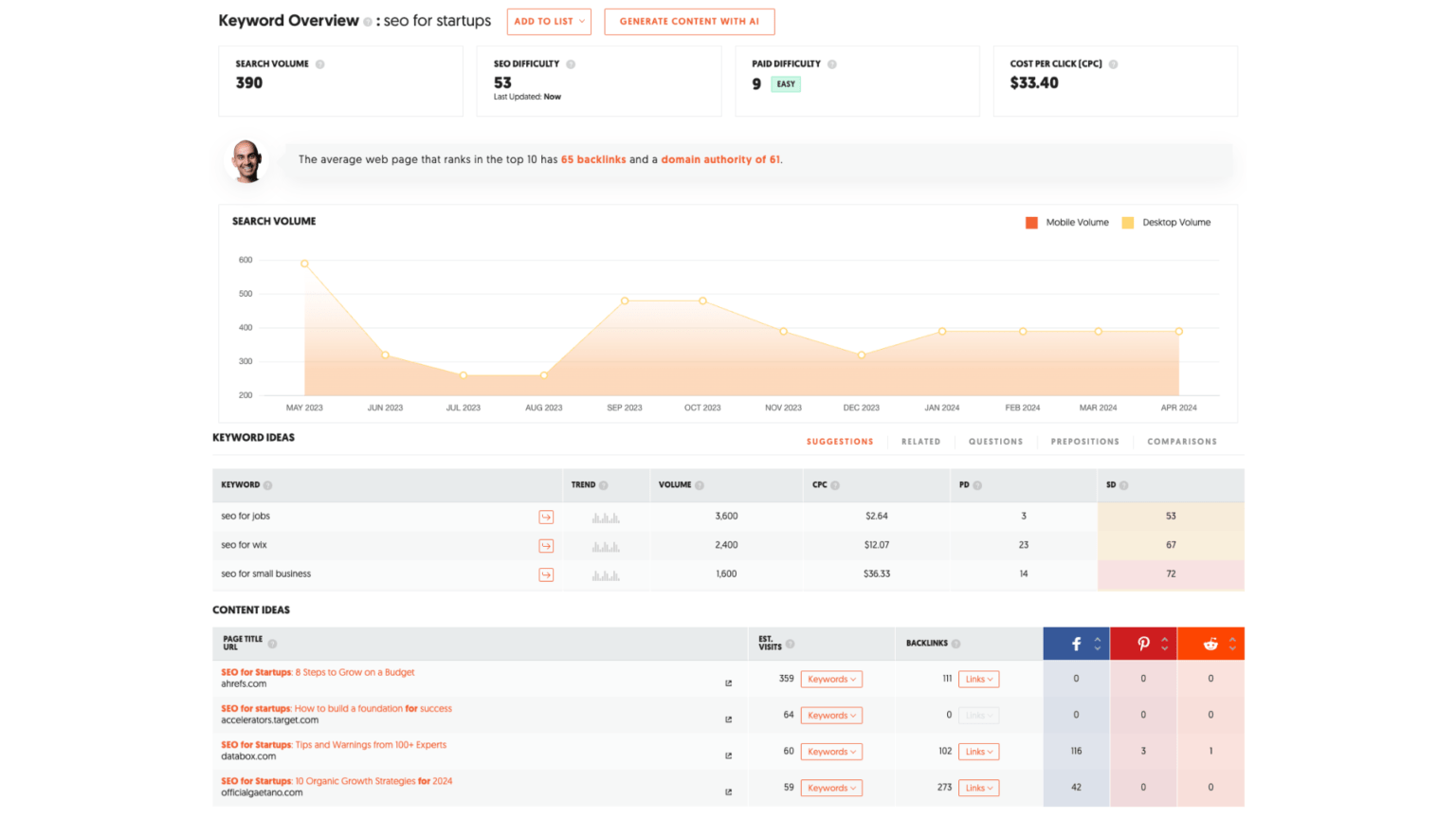In today’s digital age, startups must have a strong online presence to succeed. SEO for startups is an essential strategy to help your startup grow, raise awareness, be discovered and start making money.
Search engine optimisation (SEO) is a critical component of any digital marketing strategy, and it is particularly important for startups to prioritise SEO to improve their visibility and attract potential customers.
By implementing effective SEO strategies, startups can improve their search engine rankings, increase website traffic, and ultimately grow their businesses.
In this article, we will discuss some of the most effective SEO strategies startups can use to improve their online visibility and attract more customers. Whether you are just starting out or looking to take your startup to the next level, these SEO strategies can help you achieve your business goals.
Why SEO is important for startups?
With the rapid growth of digital adoption, more and more customers look for information and solutions online. Having a poor online presence can have a detrimental impact on your startup.
While SEO is important for all businesses, it’s even more important for startups that don’t have a strong brand name or huge customer base. SEO can help build that.
Here are some facts on why SEO is important for startup businesses.
- Increased visibility: SEO helps startups improve their visibility in search engines like Google. When potential customers search for products or services that a startup offers, they are more likely to find them on the first page of search engine results pages (SERPs).
- Cost-effective: SEO is a cost-effective way for startups to gain visibility and drive traffic to their websites. It requires an investment of time and effort rather than a large marketing budget.
- Trust and credibility: When a startup appears on the first page of SERPs, it is seen as a trusted and credible source of information. This can help startups build their brand and establish themselves as experts in their field.
- Long-term benefits: Unlike paid advertising, SEO provides long-term benefits. Once a startup’s website is optimized for search engines, it will continue to attract organic traffic for years to come.
Why should startups invest in SEO?
Startups should invest in SEO because it can help them attract more targeted traffic to their website, improve their brand visibility, and, ultimately, grow their business. Here are some reasons why startups should invest in SEO:
Increased online visibility: SEO can help your website rank higher in search engine results pages (SERPs) for keywords related to your products or services. This increased visibility can help you attract more potential customers to your website.
Targeted traffic: SEO can help you attract more targeted traffic to your website. By optimizing your website for specific keywords, you can attract visitors who are actively searching for products or services like yours.
Cost-effective: SEO is a cost-effective marketing strategy for startups. Unlike traditional advertising methods, such as print or TV ads, SEO doesn’t require a large budget to get started. With a little effort and time, you can improve your website’s search engine rankings and attract more traffic to your website.
Long-term results: SEO is a long-term marketing strategy that can provide sustainable results over time. While it may take some time to see results, the benefits of SEO can last for years, unlike other marketing methods that may only provide short-term results.
Competitive advantage: Investing in SEO can give startups a competitive advantage in their industry. By improving their search engine rankings, startups can attract more customers and gain a foothold in their market.
Brand awareness: SEO can help startups improve their brand awareness. By ranking higher in search engine results pages, startups can increase their visibility and reach a wider audience.
In today’s digital age, having a strong online presence is essential for startups to succeed. By investing in SEO, startups can improve their online visibility, attract more targeted traffic to their website, and ultimately, grow their business.
Best SEO practices for your startups
Search engine optimisation (SEO) is not just a part but a crucial cornerstone of startups’ online marketing strategies. By optimising your website and content to rank higher on search engine results pages (SERPs) for relevant keywords and phrases, you can significantly boost your online visibility, attract more potential customers, and, ultimately, enhance your business growth.
Let’s examine the best practices for improving SEO and attracting more traffic to your website.
Conduct Keyword Research
Keyword research, while it may sound complex, is actually a straightforward process of identifying the keywords and phrases that people are using to search for products or services in your industry. This essential step in SEO empowers you to understand your target audience better and the language they use when searching for your products or services.
To conduct keyword research, you can use tools such as Google Keyword Planner, SEMrush, or Ahrefs. These tools will help you to identify the keywords that have a high search volume and low competition, which means they are easier to rank for.
Personally, I use Ubersuggest, which is a more affordable equivalent to SEMrush or Ahrefs and is as powerful and informative as the latter two.
In the image below, I used Ubersuggest to analyse the keyword “SEO for startups” to gauge some understanding of its popularity and competitiveness.

Once you have identified the keywords that you want to target, you can start optimizing your website and content for those keywords.
Optimise Your Website
Website optimisation is the process of making your website more user-friendly and search engine friendly. A well-optimised website can improve your search engine rankings, increase traffic, and improve the user experience.
Some key website optimisation strategies include:
Optimising your website speed: A fast-loading website is essential for both user experience and SEO. You can use tools like Google PageSpeed Insights to identify areas where you can improve your website speed.
Making your website mobile-friendly: With more people using mobile devices to browse the internet, it is essential that your website is optimised for mobile devices. This includes using a responsive design that adapts to different screen sizes and ensuring your website is easy to navigate on a mobile device.
Creating a sitemap: A sitemap is a file that lists all of your website’s pages. It helps search engines crawl and index your website more effectively, which can improve your search engine rankings.
Optimising your website structure: Your website structure should be easy to navigate and follow a logical hierarchy. This makes it easier for users to find the content they are looking for and helps search engines understand the organisation of your website.
Optimising your website content: Your content should be high-quality, informative, and optimised for your target keywords. This includes using your target keywords in your titles, headings, and throughout your content.
Keep these in mind when you’re working on your website, as they will impact your overall SEO and website performance.
Create High-Quality Content
Creating high-quality content is essential for SEO, as search engines favour websites that provide value to users. High-quality content can also help to attract backlinks, which are links from other websites that point to your website.
To create high-quality content, you should:
Conduct research: Research your topic thoroughly to ensure you provide accurate and valuable information to your audience.
Use visuals: Visuals like images, videos, and infographics can help to make your content more engaging and shareable.
Use your target keywords: Use your target keywords throughout your content, but avoid keyword stuffing, which is the practice of using keywords excessively in an attempt to manipulate search engine rankings.
Provide value: Your content should provide value to your audience and answer their questions or solve their problems.
Nowadays, many content creators use AI-powered tools, like ChatGPT, to create content. It’s a good way to start; however, remember that your content should be relevant to your audience and may require a lot of editing.
Create Content With Search Intent

When creating content for your website, it’s important to consider search intent. Search intent refers to the reason why someone is searching for a particular keyword or phrase.
Understanding the intent behind a search query can help you create content that meets the needs of your target audience and improves your chances of ranking well in search engine results pages (SERPs). There are four main types of search intent:
Informational: The searcher seeks information on a particular topic.
Navigational: The searcher searches a specific website or web page.
Transactional: The searcher wants to purchase a product or service.
Commercial: The searcher is researching products or services before purchasing.
By designing your content with search intent in mind, you can create content that meets the needs of your target audience, improves your chances of ranking well in search engine results pages, and, ultimately, drives more traffic to your website.
You should also be very familiar with your target audience when creating content with search intent.
Understanding your audience is essential for effective SEO and online marketing. Knowing your audience can help you create content that resonates with them, use the right keywords, and target your marketing efforts effectively.
Build Backlinks
Building backlinks is a crucial part of SEO for startups, as it helps to signal to search engines that your website is valuable and relevant.
Backlinks are links from other websites that point to your website. The more high-quality backlinks you have, the more likely you are to rank higher in search engine results pages.
To build backlinks, you can engage in strategies such as guest posting on other websites, reaching out to influencers in your industry, and participating in online forums or communities. However, it’s important to remember that the quality of backlinks is more important than quantity, so focus on building high-quality backlinks from authoritative websites in your industry.
To build backlinks, you can consider:
- Guest posting: This involves writing a high-quality article for another website in exchange for a link back to your website. When guest posting, it’s essential to choose websites that are relevant to your industry and have high domain authority.
- Broken link building: This involves finding broken links on other websites and contacting the website owners to replace them with links to your website. You can use tools like Ahrefs or Broken Link Checker to find broken links on other websites.
- Participate in online forums and communities: Participating in online forums and communities relevant to your industry is an excellent way to build backlinks. You can include a link to your website in your forum signature or by posting relevant content that includes a link to your website.
- Infographics: Creating high-quality, informative, and visually appealing infographics can be an excellent way to attract backlinks. Infographics are highly shareable, and people often link back to them when they find them useful.
- Reach out to influencers: Reaching out to influencers in your industry and asking them to link to your website can be an effective way to build backlinks. However, it’s important to provide value to the influencers in exchange for the link, such as providing them with high-quality content or promoting their brand.
- Social media: Promoting your content on social media platforms can help to attract backlinks from other websites. When people share your content on social media, they are likely to include a link back to your website.
Optimise Your Website Structure
Finally, the structure of your website also plays a significant role in your SEO rankings. Ensure that your website is easy to navigate and that your content is organised into relevant categories.
Use header tags (H1, H2, H3) to break up your content and make it easy to read. Additionally, ensure that your website is mobile-friendly and has a fast loading speed.
Pay attention to how you build your website. Make sure that the pages are linked properly and follow hierarchy rules. This will help Google crawl and understand your website and its content.
FAQ: SEO for startups
What is SEO?
SEO stands for Search Engine Optimisation, which is the practice of optimising your website and content to improve its visibility and ranking on search engine results pages (SERPs).
Why is SEO important for startups?
SEO is critical for startups because it helps them attract organic traffic to their website, increase brand awareness, and generate leads and sales. It’s a cost-effective way for startups to compete with larger, established companies and reach their target audience.
How long does it take to see results from SEO efforts?
SEO is a long-term strategy, and it takes time to see results. Typically, it can take anywhere from several weeks to several months to see significant improvements in search engine rankings and traffic.
What are some common SEO mistakes that startups make?
Some common SEO mistakes that startups make include neglecting keyword research, not optimising their website for mobile devices, ignoring local SEO, not creating high-quality content, and not tracking and analysing their SEO metrics.
How can startups measure the success of their SEO efforts?
Startups can measure the success of their SEO efforts by tracking key metrics such as website traffic, search engine rankings, conversion rates, and engagement metrics such as bounce rate and time on page.
What are some free SEO tools that startups can use?
Some free SEO tools startups can use include Google Analytics, Google Search Console, MozBar, Ubersuggest, and Yoast SEO.
Should startups hire an SEO agency or do it in-house?
The decision to hire an SEO agency or do it in-house depends on the startup’s budget, resources, and expertise. In-house SEO can be cost-effective, but it requires hiring and training staff with SEO skills. Hiring an SEO agency can be more expensive, but it provides access to a team of experts with a wide range of SEO skills and experience.
Final thoughts
Starting to grow your organic traffic with SEO doesn’t require a large budget. You can make significant progress using free tools, and the paid tools required won’t break the bank. If you can afford a premium SEO tool, consider an all-in-one toolset like Ubersuggest, SEMrush, or Ahrefs that offers everything you need in one place.
As with most endeavours, the beginning stages of SEO can be challenging. It may take time to establish and execute a successful SEO strategy. However, once you do, you can use the same techniques repeatedly to generate consistent, compounded results.
We’ve covered a lot in this guide, and the information provided should serve as a great starting point for you to kick off your SEO strategy.


